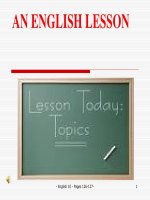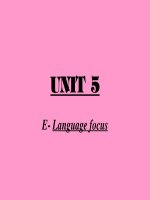Unit 12 music language focus
Bạn đang xem bản rút gọn của tài liệu. Xem và tải ngay bản đầy đủ của tài liệu tại đây (1.6 MB, 23 trang )
TRƯỜNG THPT BÀN TÂN ĐỊNH
TIẾNG ANH 10 – UNIT 12. MUSIC (LANGUAGE FOCUS)
TÁC GIẢ: NGUYỄN THỊ BẠCH HUẾ
1. LENGTE
2. TISNEL
3. ROBING
4. NSOG
5. NISGER
6. RYLILAC
7. MICSU
8. LOMSEN
GENTLE
LISTEN
Which of these words have
BORING
sounds?
SONG
/s/
SINGER
LISTEN
LYRICAL /s/
SONG
MUSIC
/s/
SOLEMN
SINGER
/z/
MUSIC
/s/
SOLEMN
/s/ and /z/
Period: 78
SEE A VIDEO ABOUT /S/ & /Z/
a. Listen and repeat:
/s/
/z/
Sue
sip
zoo
zip
piece
bus
price
peas
buzz
prize
Clic
k th
e wo
rd t
o he
Checking:
/s/
/z/
Sue
sip
zoo
zip
piece
bus
peas
buzz
price
prize
ar th
e so
und
b. Practice these sentences :
/s/
/s/
/z/
/z/ Click the sentences to hear the sound
1. Susan loves classical music.
/s/
/z/
/z/
2. I like to listen to jazz records.
/s/
/z/
3. My aunt like to watch the film “The Sound of Music”.
/z/
/s/
/z/
4. But my cousin prefers going to concerts.
/z/
/s/
/s/
/z/
5. He’s won the first prize for singing folk songs.
/s/
/s/
/z/
/z/
6. I’d like a piece of bread and some peas, please.
a. To + Infinitive:
A: What do you use a dictionary for?
B: I(find
use athe
dictionary
meaning of new
meaning to
of find
newthe
words)
words.
A: What do they do morning exercise for?
B: They
morning
(have do
good
health)exercise to have good
health.
Form:
Meaning:
What…….for?
Để (làm gì)
* What do we use “To + Infinitive” for?
We use “To + Infinitive” to talk about
purpose.
Use:
To-infinitive trả lời cho câu hỏi
what ….for?
Exercise 1: Work in pairs. Use the words in brackets to answer
the questions.
1. What did you phone her for?
(tell her
good
news)
I
phoned
herthe
to tell
her
the good news.
2. What are you saving money for?
(buy
a cassette
I’m
saving
money toplayer)
buy a cassette player.
3. What does she practice singing all day for?
She
practises
singingcontest)
all day to win the singing
(win
the singing
contest.
4. What are you learning French for?
learning
(sing French
songs)
I’m
French
to sing French songs.
5. What does the monitor always go to class on time
for?
The
monitor
always
goesfor
to class
on time to set a good
(set
a good
example
the class)
example for the class.
1. What is this?
This is a dictionary.
thing
2. How many people are there?
There are three people.
quantity
3. Who teaches you English?
Ms. Hue teaches us English.
person
b. WH – Questions:
When
Where
Who
Why
What
How many
How much
……….
WH_ +
Time
Place
Person
Reason
Object / idea / action
Quantity (countable)
Price, amount (uncountable)
……
Aux
+ Subject + Vo?
WH_ + Verb?
Exercise 2: Ask questions for the underlined
words/phrases in the following sentences.
0. I go to school in the afternoon.
Time
When do you go to school?
1. I’ll stay at home and watch TV if it rains. What/do
2. I usually listen to music in my free time. What/do
3. He left for Ho Chi Minh City last week. When/leave
Who
4. James wants to talk to you.
What/do
5. We played chess together last night.
When/start
6. The film starts at 8:00 p.m.
Who
7. My favourite musician is Beethoven.
8. I like pop music because it helps me relax. Why
What will you do if it rains
1. A: ………………………………?
B: I’ll stay home and watch TV if it rains.
What do you usually do in your free time
2. A: ……………………………………………?
B: I usually listen to music in my free time.
When did he leave for Ho Chi Minh City
3. A:………………………………………..…?
B: He left for Ho Chi Minh City last week.
Who wants to talk to me
4. A: ……………………………….?
B: James wants to talk to you.
What did you do last night
5. A:………………………………?
B: We played chess together last night.
When does the film start
What time does the film start
6. A:…………………………………?
B: The film starts at 8:00 p.m.
Who is your favourite musician
7. A:……………………………………….?
B: My favourite musician is Beethoven.
Why do you like pop music
8. A:………………………………?
B: I like pop music because it helps me relax.
* Homework:
- Do Exercise 2 in the textbook (page 131)
- Prepare next lesson Unit 13: READING









